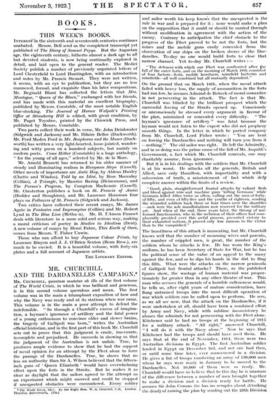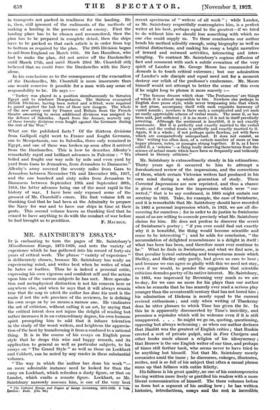MR. CHURCHILL AND THE DARDANELLES CAMPAIGN.*
MR. Chuacitru., quantum mutatus ab illo of the first volume of The World Crisis, in which he was brilliant and generous, is in this second volume querulous and mean. The first volume was in the main a triumphant exposition of how and why the Navy was ready and at its stations when war came. This volume is in the main a poor attempt to defend the indefensible. "So through a Churchill's excess of imagina- tion, a layman's ignorance of artillery and the fatal power of a young enthusiasm to convince older and slower brains, the tragedy of Gallipoli was born," writes the Australian official historian, and in the first part of this book Mr. Churchill sets out to prove that this judgment is crude, inaccurate, incomplete and prejudiced. He succeeds in showing us that the judgment of the Australian is not unfair. True, he produces ample evidence to show that he had the support of naval opinion for an attempt by the Fleet alone to force the passage of the Dardanelles. True, he shows that no less an authority than Sir A. Wilson believed that the fifteen- inch guns of 'Queen Elizabeth' would have overwhelming effect upon the forts in the Straits. But he makes it as clear as daylight that the sailors agreed to the attempt as an experiment which might succeed and could be stopped if unexpected obstacles were encountered. Every soldier 04116 World Crier*-1945: By the Eight lion. W.* S.- Churchill, London.
Thornton Butterworth, 003.i
and sailor worth his keep knows that the unexpected is the rule in war and is prepared for it ; none would make a plan on the supposition that it could or should be carried through without modification in agreement with the action *of the enemy. Contrary to anticipation the chief obstacle to the progress of the Fleet proved to be not the forts, but the mines and the mobile guns easily concealed from the observation of our ships on the broken shores of the Dar- danelles. To-day no one would build forts to close that narrow channel. Yet to-day Mr. Churchill writes :—
" The defences with which our Fleet was confronted after the fall of the outer forts, and on the morning of March 18th consisted of four factors—forts, mobile howitzers, minefield batteries and minefields—all well combined but all mutually dependent."
On the ground that on March 18th, when the naval attack failed with heavy loss, the supply of ammunition in the forts
had run low, he accuses Admiral de Robed( of moral cowardice in not persevering in the attack. The fact is that Mr. Churchill was blinded by the brilliant prospect which the successful forcing of the Straits opened up. Consciously or unconsciously he stressed every argument in favour of the plan, minimized or concealed every difficulty. "The layman's ignorance of artillery" was fatal because the layman would not listen to the expert who did not prophesy smooth things. In the letter in which he parted company from Mr. Churchill, Lord Fisher wrote : "You are bent on forcing the Dardanelles and nothing will turn you from it —nothing." The old sailor was right. He left the Admiralty, and in so doing was the prime cause of the fall of Mr. Asquith's Government, a fact which Mr. Churchill conceals, one may charitably assume, from ignorance. But it is in his dealings with the soldiers that Mr. Churchill is at his worst. He attacks all the generals, British and
Allied, save only Hamilton, with impartiality and with a subversion of truth, a misstatement of fact which defy complete answer within the limits of a review.
"Good, plain, straightforward frontal attacks by valiant flesh and blood against wire and machine guns 'killing Germans' while Germans killed Allies twice as often, calling out the men of forty. of fifty, and even of fifty-five and the youths of eighteen, sending the wounded soldiers back three or four times over the shambles —such Were the sole manifestations now reserved for the military art. And when at the end, three years later, the throng of uni- formed functionaries, who in the seclusion of their offices had com- placently presided over this awful process, presented victory to their exhausted nations, it proved only less ruinous to the victor than to the vanquished."
The beastliness of this attack is nauseating, but Mr. Churchill knows well that the number of mourning wives and parents, the number of crippled men, is great, the number of the soldiers whom lie attacks is few. He has worn the King's uniform, he has been Secretary of State for War, but he has the political sense of the value of an appeal to the many against the few, and so he dips his hands in the dirt to fling this filth. What were the attacks on the narrow peninsula of Gallipoli but frontal attacks? There, as the published figures show, the wastage of human material was propor- tionately far greater than in any other theatre of war. This man who accuses the generals of a horrible callousness would, he tells us, after eight years of mature consideration, have flung untrained troops into the most difficult operation of war which soldiers can be culled upon to perform. He sees, as we all see now, that the attack on the Dardanelles, if it were undertaken at all, should have been a combined effort by Army and Navy, while with sublime inconsistency he abuses the admirals for not persevering with the Fleet alone. Kitchener said he had no troops at the beginning of 1915 for a military attack. "All right," answered Churchill, "I will do it with the Navy alone." Now he says that Kitchener had the troops and should have used them. He says that at the end of November, 1914, there were two Australian divisions in Egypt. The first Australian soldier landed in Egypt on December 3rd, and not one had then, or until some time later, ever manoeuvred in a division. He gives a list of troops numbering an army of 150,000 men whom he says were ready in January to be moved to the Dardanelles. Not 10,000 of them were so ready. Mr. Churchill would have us believe that to this day he is unaware of the difference between a number of men brought together
to make a division and a division ready for battle. He accuses Sir John Cowans (he has no scruples about attacking the dead) of ruining the plan by sending out the 20th Division in transports not packed in readiness for the landing. He is, then, still ignorant of the rudiments of the methods of making a landing in the presence of an enemy. First the landing place has to be chosen and reconnoitred, then the plan has to be prepared in complete detail, then the ships have to be packed so that each article is in order from top to bottom as required by the plan. The 29th Division began to sail from England on March lath. Sir Ian Hamilton, who had to make the plan, did not arrive off the Dardanelles until March 17th, and until March 23rd Mr. Churchill still believed that we could force the Dardanelles with the Navy alone.
In his conclusions as to the consequences of the evacuation of the Dardanelles, Mr. Churchill is more inaccurate than one would conceive it possible for a man with any sense of responsibility to be. He says :—
" Turkey was placed in a position simultaneously to threaten Egypt and to reinforce Mesopotamia. The thirteen evacuated British Divisions, having been rested and re Wed, were required to guard against the last two of these new dangers. The whole of the new army sent by France and Britain from the French theatre amounting to seven additional divisions was assigned to the defence of Salonika. Apart from the Anzacs, scarcely any of these twenty divisions even fought against the Germans during the rest of the War."
What are the published facts ? Of the thirteen divisions from Gallipoli eight went to France and fought Germans, one to Mesopotamia, one to Salonika, three only remained in Egypt, and one of these was broken up soon after it arrived from the Dardanelles. This is how he describes Allenby's remarkably rapid and brilliant advances in Palestine : "We toiled and fought our way mile by mile and even yard by yard from Gaza to Jerusalem, from Jerusalem to Damascus." Allenby's army covered the seventy miles from Gaza to Jerusalem between November 7th and December 0th, 1917, and the one hundred and sixty miles from Jerusalem to Damascus between September 10th and September 30th, 1918, the latter advance being one of the most rapid in the history of war.. I have here only exposed some of the grossest of Mr. Churchill's errors. His first volume left us thanking God that he had been at the Admiralty to prepare the Navy for war and to have our ships in time at their posts. This second volume leaves us thanking God that he ceased to have anything to do with the conduct of war before



























































 Previous page
Previous page